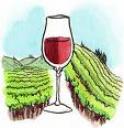I mentioned “terroir” in my last post. I’m sorry for repeating something just mentioned, but since it is not a common expression outside of wine circles let me reiterate. “Terroir” is described by Wikipedia as “a way of describing the unique aspects of a place that influences and shapes the wine made from it”. These “aspects” could include soil, weather, altitude, etc…
I bring up terroir again as it is a buzz word within the wine world. It is also a word that I am CERTAIN has great relevance when it comes to Israeli wines.
I believe that when not manipulated too much Israeli wines are an incredible combination of new world and old world. They possess earthy old world qualities in addition to fruity new world qualities. And I think this is one of the amazing things about many Israeli wines and an important factor in making them so special.
Back to “terroir” though, I believe the concept of terroir is important to Israeli wines given that they possess sumptuously unique herbal qualities. I have heard spices such as Thyme, Sage, Rosemary and sometimes even Mint used to describe Israeli wines. I have also heard some describe (what I believe to be) this same herbally component as green olive. I mention these unique and interesting descriptors before mentioning why I think recognizing these flavors and aromas is so important.
I have been pounding the pavement of Manhattan selling Israeli wines the past few months and there have been a few people whose palates I respect who have described some of the Israeli wines I tasted with them as having a “green” quality. This descriptor is not a positive one. Sure some people like it (and they are certainly NOT wrong) but it indicates a wine that is either bitter, under-ripe (something that used to be very common with French and other cool climate wines) or simply overly herbaceous rather than fruity. This “green” profile often occurs as a result of wines made from young, immature vines. Or it may be a wine that has been pressed too much and bitterness is extracted from seeds and skins and have overpowered the fruit of the wine.
Some well regarded wine critics have recently called many Israeli wines “green” (while at the same time praising the wines??). And while I appreciate (and at times am envious of) their work, in general we all know how I feel about critics. They certainly serve a purpose, but their influence has become too powerful (shame on us lay-wine-people).
Bottom line, call it what you will. Israeli terroir. Herbal. Herbaceous. Green. WHO CARES. Try it, and if you like it BUY SOME, BUY MORE, and TELL YOUR FRIENDS!!
Happy herbal Israeli wine tasting!
WTG
Tags: green, Israeli Wine, terroir

Warning: Declaration of Social_Walker_Comment::start_lvl(&$output, $depth, $args) should be compatible with Walker_Comment::start_lvl(&$output, $depth = 0, $args = Array) in /home/u640618151/domains/winetastingguy.com/public_html/wp-content/plugins/social/lib/social/walker/comment.php on line 18
Warning: Declaration of Social_Walker_Comment::end_lvl(&$output, $depth, $args) should be compatible with Walker_Comment::end_lvl(&$output, $depth = 0, $args = Array) in /home/u640618151/domains/winetastingguy.com/public_html/wp-content/plugins/social/lib/social/walker/comment.php on line 42
I REALLY like this post.
I think the Israeli wine style is still evolving and that there is a ton of wine styles within it at present.
Frankly, I think an earthy aroma/flavor profile can be a welcome relief from the knock-you-out New World big fruit-juice reds that feel fake and almost synthetic to me.
I like a wine that tastes like the place where it came from and I think Israeli wines are well-positioned to provide that!
Richard